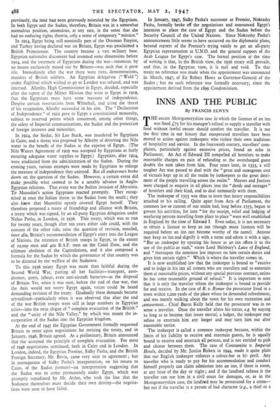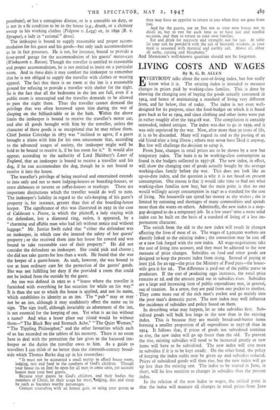INNS AND THE PUBLIC
By' FRANCIS ELWYN
THE recent Montgomeryshire case in which the licensee of an inn was fined £75 for his manager's refusal to supply a traveller with food without lawful excuse should comfort the traveller. It is not the first time in our history that exasperated travellers have been moved to action against innkeepers who violate their own traditions of hospitality and service. In the fourteenth century, travellers' com- plaints, particularly against excessive prices, found an echo in Parliament. An Act of Edward III compelled all hostelers to make reasonable charges on pain of refunding to the overcharged guest double the sum taken from him. Four years later, in 1353, a still tougher Act was passed to deal with the " great and outrageous cost of victuals kept up in all the realm by innkeepers to the great detri- ment of the people travelling across the realm." Mayors and Justices were charged to enquire in all places into the " deeds and outrages " of hostelers and their kind, and to deal summarily with them.
The innkeeper of 1353 was thus to learn that heavy responsibilities attached to his calling. Quite apart from Acts of Parliament, the common law or custom of our realm had, long before 1353, begun to govern his activities, for inns " for the receipt, relief and lodging of wayfaring persons travelling from place to place " were well established in England by the time of Edward I. Even today, it is not necessary to obtain a licence to keep an inn (though many licences will be required before an inn can become worthy of the name). Anyone may keep an inn and dignify it with a name and adorn it with a sign. " But an innkeeper by opening his house as an inn offers it to the use of the public as such," states Lord Halsbury's Laws of England, and " thereupon the common law imposes on him certain duties and gives him certain rights." Which is where the traveller comes in.
It is now established law that the innkeeper is bound to "receive and to lodge in his inn all corners who are travellers and to entertain them at reasonable prices, without any special previous contract, unless he has some reasonable ground of refusal." It is important to note that it is only the traveller whom the innkeeper is bound to provide for and receive. In the case of R. v. Rymer the prosecutor lived in a town within 1,2oo yards of the place where he demanded refreshment, and was merely walking about the town for his own recreation and .amusement., Chief Baron Kelly held .that the prosecutor was in no sense a traveller. Once the traveller alters his status, e.g. by staying so long as to become that lesser mortal, a lodger, the innkeeper may refuse to entertain him any longer and may' turn him out after reasonable notice.
The innkeeper is called a common innkeeper because, within the limits of his liability to receive and entertain guests, he is equally bound to receive and entertain all persons, and is not entitled to pick and choose between them. The case of Constantine v. Imperial Hotels, decided by Mr. Justice Birkett in 1944, made it quite plain that our English innkeeper enforces a colour-bar at hi-, peril. Any traveller who is ready to pay for his accommodation and conduct himself properly can claim admission into an inn, if there is room, at any hour of the day or night ; and if the landlord refuses it the traveller can sue him in a civil court for damages, or, as in the Montgomeryshire case, the landlord may be prosecuted for a crime— but not if the traveller is a person of bad character (e.g., a thief or a
prostitute), or has a contagious disease, or is a constable on duty, or is not in a fit condition to be in the house (e.g., drunk, or a chimney sweep in his working clothes (Pidgeon v. Legg) or, in 1899 (R. v.
Sprague), a lady in " rational" dress).
The innkeeper is bound to supply reasonable and proper accom- modation for his guest and his goods—but only such accommodation
as he in fact possesses. He is not, for instance, bound to provide a frost-proof garage for the accommodation of his guests' motor-cars (Winkworth v. Raven). Though the traveller is entitled to reasonable
and proper accommodation, he is not entitled to insist on a particular room. And in these days it may comfort the innkeeper to remember that he is not obliged to supply the traveller with clothes or wearing apparel. The fact that there is no room at the inn is a reasonable ground for refusing to provide a traveller with shelter for the night. So is the fact that all the bedrooms in the inn are full, even if a public room is unoccupied and the traveller demands to be allowed to pass the night there. Thus the traveller cannot demand the
privilege that was often bestowed upon him during the war of sleeping on the billiard-table or in the bath. Within the above limits the innkeeper is bound to receive the traveller's motor car, and also all goods brought with him by the traveller, unless the character of these goods is so exceptional that he may refuse them. Chief Justice Coleridge in 1875 was " inclined to agree, if a guest brought a piano with him for his own amusement that, according to the advanced usages of society, the innkeeper might well be held to be bound to receive it, if he has room for it." It would also appear, according to the authority of Lord Halsbury's Laws of England, that an innkeeper is bound to receive a traveller and his dog, if he can accommodate the dog, though he is not bound to
receive it into the house.
The traveller's privilege of being received and entertained extends
to inns only and not to mere lodging-houses or boarding-houses, or mere alehouses or taverns or coffee-houses or teashops. These are important distinctions which the traveller would do well to note. The innkeeper's liability in regard to the safe-keeping of his guest's property is, for instance, greater than that of the boarding-house keeper. The significance of this was illustrated in 1932 in the case of Caldecutt v. Piesse, in which the plaintiff, a lady staying with the defendant, lost a diamond ring, stolen, it appeared, by a "charming and affable man who had left without notice and without luggage." Mr. Justice Swift ruled that " either the defendant was an innkeeper, in which case she insured the safety of her guests' property ; or she received them into her house for reward and was bound to take reasonable care of their property." He did not consider the defendant an innkeeper. She could pick and choose ; she did not take guests for less than a week. He found that she was the keeper of a guest-house. As such, however, she was bound to use at least ordinary care for the protection of the guests' goods. She was not fulfilling her duty if she provided a room that could
not be locked from the outside by the guest.
An inn was defined in 192o as a " house where the traveller is furnished with everything he has occasion for while on his way." It is thus the use to which the house is applied, and not its name, which establishes its identity as an inn. The " pub " may or may not be an inn, although it may confidently affect the name on its sign. The sign itself, although invariably an adornment of the inn, is not essential for the keeping of one. Yet what is an inn without a name? And what a lesser place our island would be without them—" The Black Boy and Stomach Ache," "The Quiet Woman," " The Tippling Philosopher," and the other favourites which each of us has recorded on the tablets of his memory. There is no room here to deal with the protection the law gives to the harassed inn- keeper or the duties the traveller owes to him. As a guide to travellers I can think of no better than the sixteenth-century broad- side which Thomas Burke dug up in his researches:
" It must not be accounted a small matter to afford house room, lodging, rest and food to the comforts of God's children. Though your house (as an Inn) be open for all men to come unto, yet account honest men your best guests.
Because your guests be God's children, and their bodies the members of Christ, let their usage for meat,"lodging, diet and sleep be such as becomes worthy personages.
Content yourselve% with an honest gain, so using your guests as
they may have an appetite to return to you when they are gone from you.
And for the guests, use an Inn not as your own house, not to dwell in but to rest for such time as ye have just and needful occasion, and then to return to your own families. Eat and drink for necessity and strength; not for lust. At table let your talk be powder'd with the salt of heavenly wisdom, as your meat is seasoned with material and earthly salt. Above all, abhor all oaths, cursing and blasphemy." And Shenstone's well-known quatrain should not be forgotten.



































 Previous page
Previous page